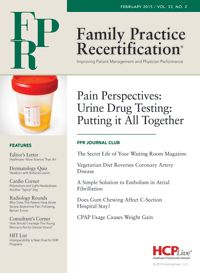Publication
Article
Family Practice Recertification
Looking at the Connection Between Pertussis Vaccinations and Asthma
Author(s):
Based upon casual observation, some have suggested that the rise in the diagnosis and incidence of asthma is related to the pertussis vaccine. This study in Sweden attempted to determine if such a relationship exists.

Frank J. Domino, MD
Review
“Does Pertussis Vaccination Increase the Risk of Asthma,” Pediatrics 2014: 134(4); 721-728.
Study Methods:
Eighty-two thousand newborn children were immunized for pertussis beginning in June of 1993 through June of 1994 and followed through their teenage years. They were compared to 100,000 non-vaccinated children who were born before the trial’s evaluation. Participants were studied for the incidence of asthma based upon use of prescription asthma medication during a follow-up over the next 15 years.
Results:
Prevalence rates for asthma in the study population ranged between 4.6% and 7.0%. The adjusted odds ratio after intention to treat analysis for any asthma medication was 0.99 (95% CI: 0.95-1.03). The odds ratio for prescription for anti-inflammatory asthma medicine, after adjusting for confounders, was 0.97 (95% CI: 0.92-1.01). Both were not statistically significant.
Conclusion:
Pertussis immunization in infancy does not increase the risk of asthma medication use in adolescence.
Discussion:
This study, as well as many others, demonstrates no correlation between pertussis vaccination in infancy and the development of asthma in adolescence or later. A number of studies from the late 90s and early 2000s hinted at an increased incidence of asthma possibly being related to childhood immunizations. At that time, pertussis was theorized as the cause. The rationale for this was a decreased infection rate and the idea that the pertussis vaccine may have prevented or altered T-helper cell function and regulation.
Other recent studies have looked for an association and found none. But these studies were small and were challenged by an increased risk of bias. This current study overcomes that risk by including a large number of patients in a country where healthcare data and outcomes are closely followed through their national health insurance program.
The large strength of this study is its evaluation of 80,000 children against 100,000 non-vaccinated children and with extremely high follow-up of those participants.
The main weakness, however, is correlating a lifetime development of asthma to its development by late adolescence. If pertussis immunization does increase the risk of adult onset asthma, this study could not identify the link between the two conditions. It also does not use the absolute diagnosis of asthma, but rather the use of asthma medication as an indicator for asthma.
This study provides convincing evidence that pertussis immunization in infancy does not increase the risk of symptomatic asthma in teenagers. It would be ideal if these researchers followed this cohort forward over their lifetime to determine if they develop asthma. Until that data is available, the benefits of pertussis immunization far outweigh the potential for an adverse risk.






